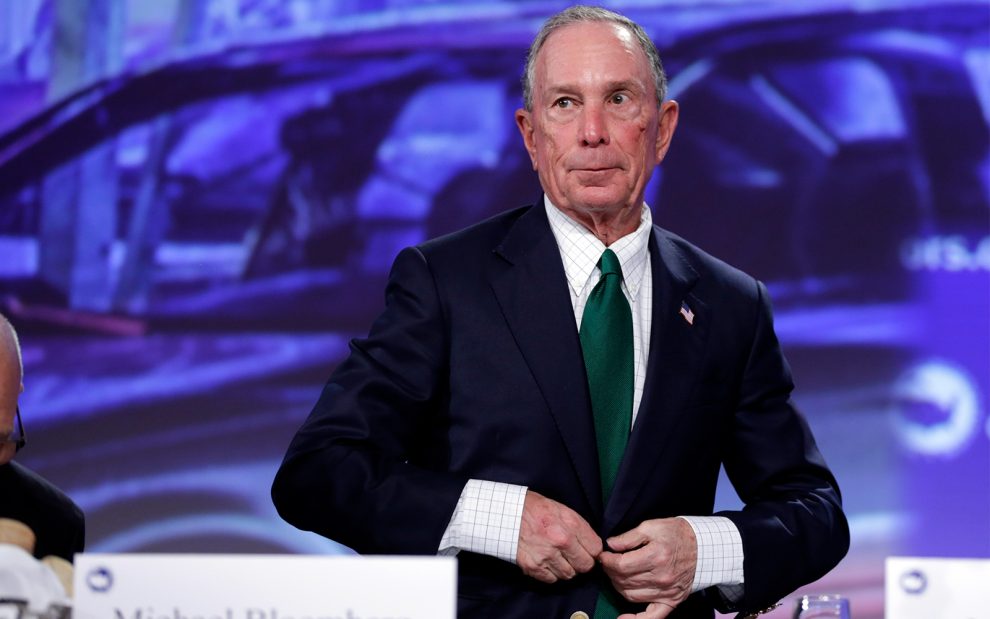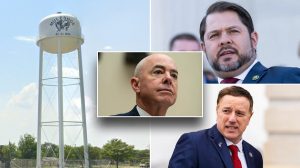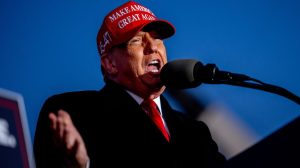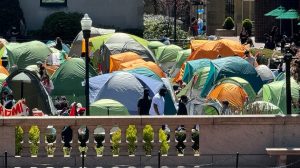Democratic 2020 candidate Michael Bloomberg says he will recruit “an awful lot more” immigrants “to take all the different kinds of jobs” in the U.S. economy.
The immigrants can “improve our culture, our cuisine, our religion, our dialogue, and certainly improve our economy,” Bloomberg told reporters without naming the American cultures, cuisines, religions, and dialogues that would be improved.
Bloomberg’s comments reflect the views of wealthy investors who gain stock market wealth when the government imports more workers, welfare-aided consumers, and extra renters into communities created by Americans and their children.
In his comments, Bloomberg echoed the 1960s claim that the U.S is a diverse “nation of immigrants,” instead of a country build by similar-minded settlers from Europe. “This country was built by immigrants,” Bloomberg said, without noting the role played by Americans and their children.
Bloomberg, who owns roughly $55 billion in assets, has long supported mass migration. In 2013, he joined with the owner of Fox News, Rupert Murdoch, to create the Project for a New American Economy. The group of investors and politicians pushed for passage of the Gang of Eight amnesty in 2013.
In 2019, the group is pushing for the S.386 law that would help investors by encouraging many more Indian graduates to take white-collar jobs from American graduates.
Bloomberg’s group is also pushing for legislation that would provide an endless supply of H-2A visa workers to investors in the agriculture sector. The wage-capped workers would likely displace Americans, reduce pressure on investors to buy high-tech farm machinery, and convert many agriculture towns into “company towns” dominated by a single employer.
NC GOP @SenThomTillis wants to reward India's workers who take US jobs from American graduates. He's backing @SenMikeLee's @S386 bill which gives citizenship to Indians for taking Americans' jobs. Big subsidy for US investors, big loss for NC graduates. https://t.co/LWeAMULh0C
— Neil Munro (@NeilMunroDC) November 7, 2019
The U.S. already imports many immigrants — roughly one million per year, even as four million Americans turn 18 and prepare to join the workforce.
“We need an awful lot more immigrants rather than less,” Bloomberg told reporters after he filed the paperwork needed to join the Democratic Party’s primary in Arizona:
We have to go out and actually try to recruit immigrants to come here. We need immigrants to take all the different kinds of jobs that the country needs – improve our culture, our cuisine, our religion, our dialogue, and certainly improve our economy.
Bloomberg — who has a personal wealth of roughly $55 billion — then blasted President Donald Trump’s campaign to block the wave of Central American migrants sparked by the establishment’s tacit support for mass migration:
I think what Donald Trump has done, of ripping kids away from their [migrant] parents, is a disgrace. I think of what we’re done, where we don’t know who we’re taking in, and we don’t help people when we’re here, is a disgrace. I think talking about deporting 11 million people is so outrageous to try to explain to your kids what that was all about. Our immigration system is broken and we’re not doing anything to fix it.
In 2013, the Congressional Budget Office (CBO) predicted the planned “Gang of Eight” amnesty would shift more of the nation’s new wealth from workers to investors.
The flood of roughly 30 million immigrants in ten years would cause Americans wages to shrink, the report said. “Because the bill would increase the rate of growth of the labor force, average wages would be held down in the first decade after enactment,” the CBO report said.
But all that cheap labor would boost the profits and the stock market, the report said. “The rate of return on capital would be higher [than on labor] under the legislation than under current law throughout the next two decades,” says the report, titled “The Economic Impact of S. 744.”
In contrast, Trump’s opposition to Central American migrants and to amnesty bills sought by the establishment has helped to nudge up wages for blue-collar Americans, especially in the midwest battleground states, according to a November 26 report posted by Bloomberg’s news service:
Personal income growth has been surging in some political U.S. battlegrounds, including a third of the counties in Pennsylvania — which Donald Trump narrowly flipped in 2016 and may need to win re-election next year.
In the president’s first two years in office, a total of 325 counties representing nearly 6% of the U.S. population experienced their best annualized income gains since at least 1992, according to data compiled by Bloomberg News. And 127 of those are located in perennial swing states, including Ohio and Iowa.
Good news: GOP Reps. voted against wage-cuts and job outsourcing.
Bad news: GOP Reps only voted against the cuts b/c they were wrapped in a farmworker amnesty which would cut GOP jobs in 2026.
Good News: The same standoff is protecting US grads from #S386https://t.co/HRVdRNjooJ— Neil Munro (@NeilMunroDC) November 22, 2019
Story cited here.
Scroll down to leave a comment:





























